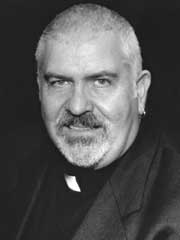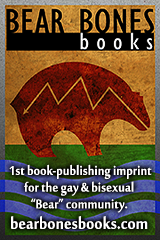Bear Affirmation, Bear Activism: Interview with Rev. Troy Perry by Ron Suresha |
|
Ron: Tell me about your life as a Bear. Rev. Perry: I consider myself a leatherbear. Of course, now I’m 62 years old, so I’m a polar leatherbear. I’m part of both the leather and bear communities. Ron: Have you attended any bear functions, nationally or locally? Rev. Perry: Several years ago, when I served as a judge for International Mr. Leather, I discovered that the Bear convention was also taking place in Chicago then. Ron: Bear Pride. Rev. Perry: Right. So I went over to Bear Pride for a little while. I didn’t get to stay long, because of my judging duties, but I wanted to say hello to folks. Locally, not often, except when the bear community here has a beer bust, once in a great while. Ron: You wrote in your autobiography, The Lord Is My Shepherd and He Knows I’m Gay, about some resentment you held as a young gay man of “fags” and effeminate gay men. Did you identify more with masculine gay men then? I’m sure that your thinking about that issue has changed. Rev. Perry: Of course it has. When I first came out of the closet, though, I thought, “Oh dear God, all these effeminate gay men are going to embarrass us!” I thought at first that it was just awful. But then my first gay friend – who later became my roommate – turned out to be very effeminate. So, I came to just love the entire community immediately. Sexually, however, I’ve always been attracted to men who were men, period. I’m not turned off by the way people act, or speak, or cut up. When I went to look for a lover, though, I went to look for someone who looked like me. Ron: So the Bear image and homomasculine community very strongly appealed to you. Rev. Perry: Absolutely. I always liked men, naturally acting men. I was raised in the South. It’s real interesting that I have a place in my heart for blue-collar workers because of where I was raised and what happened to me as a kid. Ron: I grew up in Detroit, so I know all about that place. Rev. Perry: So you know what I’m talking about! When I was coming out, too, something very strange and wonderful happened to me. I met a clergyperson in a gay bar. He was a big bear, and he was pastoring a Congregational church in Los Angeles. He and I dated; we were never lovers. He was in the closet, I think, much more than I was, but was very nice to me and gave me pointers that have taught me the rest of my life. We had sex briefly, just like gay men did back then (and just as they do now!). But it was more than that. He was actually a mentor whom I will always appreciate. My lover now, Phillip, and I have been together for 17 years. Phillip is a cub and he’s a natural man, very attractive, and as hairy as all get-out. He’s a true bear in that regard. I’m hairy, too, but not like Phillip. Ron: I don’t mean to perpetuate a stereotype, but it’s striking – the number of priests and pastors and other men of the cloth that I’ve come across who identify, or could be described, as bearish. Rev. Perry: As the song goes, the hills are alive! [both laugh] I’m always amazed, but it’s really the truth. Ron: Were you big when you were younger? Rev. Perry: When younger, I was thin as a rail. As I’ve grown older, I’ve put on weight. I have continued to love myself in all those roles. Part of my spirituality, I always tell people, is to accept yourself for who you are. When MCC first started, I used to get people who were very concerned about their weight come to me, “You know, I’m a big guy.” And I said to them, “Oh, just you wait! There’s somebody for everyone in the gay and lesbian community. You’ll find that person for your life.” Sure enough, that’s what happened in most cases. Ron: You offered them affirmation. Rev. Perry: That’s correct. There was another man in my church who was a big ol’ bear and, I swear to God, people just loved him, and he certainly had no problems meeting people and having wonderful relationships. Ron: But you also understand that a great number of bear-identified men, because they’re perceived by the gay mainstream to be less than ideal physically, are disparaged in the same way that gays are disparaged by straights. Rev. Perry: Of course. I’m familiar that every ad in America, especially in our gay male newspapers, reinforces that negative image. Ron: Especially where you live, in LA. Rev. Perry: Here, if you don’t have a 28-to-32-inch waist, you’re not considered attractive, which is the craziest thing I ever heard of. I thank God that one thing that happened when the bear community started was that more people began to say no to that nonsense and to say, “Here I am naturally, just as I am. I’m as smart and as talented as anyone else. We don’t all have to be bodybuilders to be attractive and to work in the movement in our communities.” Ron: Do you feel there a message of affirmation in the coming of age of bear subculture? Rev. Perry: Absolutely. I think it is so important that people find other people who look like themselves, and realize and know that affirmation, whoever we are, whatever we do. I sometimes say in MCC, “If you don’t hear anything else I say, remember this: ‘God didn’t create you so that God could have something to sit around and hate.'” Poor self-image in our community can be so vicious because of the way people treat other people. All of us have to realize that we’re attractive, we’re hunks, we look good, we think intelligently, and we should never take a backseat to anybody in our community. Ron: Certainly. There’s a dual side to that, too, though: when bears then get an attitude and disparage “twinks.” Rev. Perry: Right, it can work both ways. Ron: I’m interested in hearing your perspective on how communities form, especially since you have a longstanding involvement with the leather community. Rev. Perry: There are lots of bears into leather. There’s crossover between the two communities. Certainly not everybody who’s in the leather community is a bodybuilder. In the leather community you find all types. When I first founded MCC, nine months before Stonewall, there were almost no other any gay organizations in America. Today, look at how people organize – it’s incredible, and it’s good for our community. Whether it’s gay stamp collectors or gay bears, it’s so important that we stand together around important issues. Ron: Do you feel that the organizing that MCC served as a model of sorts for bearclubs and leather/Levi clubs? Rev. Perry: Yes, I do. I’ll tell you why. Historian Dennis Altman wrote in his book The Homosexualization of America, that, in MCC’s first five years, the organization was truly a mixture of everybody. When we said everybody was welcome, we meant it. Ron: The Bear phenomenon may be described better as a social than a political movement. What might this movement represent in the evolution of gay (and human) liberation? Rev. Perry: Even as a social organization – and that’s the way much of the bear community would see itself – I would still hope to God that they’d be smart enough to say, “Listen, on this issue, they’re trying to take our rights away. Whether it’s us or somebody else, we have to stand up for this issue.” At least on occasion, give permission to someone in the group to make a statement. Ron: So, regardless of its current largely apolitical stature, you’re saying that there should be a political component to bear organizations? Rev. Perry: There has to be. I don’t think there’s any way that the bear community can get away from that. My friend Danny, a member of MCC New York, is as involved politically as he is active in his bearclub. He may not do it in his bearclub’s name, but Danny is still involved in liberation for all people, and for human rights for us all. Sometimes, bearclubs need to say, “We need to pass a resolution on this issue. It’s the least that we can do.” Or at least send out a statement saying, “Look, this bill is going to affect us, too. We may be having a nice time in our social club, but we have to speak up, speak out, on this issue.” Maybe not on every topic, but you have to do it on some things. Ron: Amen to that. Originally published in American Bear magazine, August 2002. |
author, activist, and anthologist of books centering on gay and bisexual male subcultures

 The Reverend Elder Troy Perry is an openly gay clergyman, activist, and the founder of Metropolitan Community Churches (MCC), a denomination for gay/lesbian/bi/trans people which was started with 12 people in his living room in Los Angeles on October 6, 1968. MCC has grown, despite opposition and adversity, to 44,000+ people in over 300 congregations in 17 countries around the world. Rev. Perry has authored an autobiography,
The Reverend Elder Troy Perry is an openly gay clergyman, activist, and the founder of Metropolitan Community Churches (MCC), a denomination for gay/lesbian/bi/trans people which was started with 12 people in his living room in Los Angeles on October 6, 1968. MCC has grown, despite opposition and adversity, to 44,000+ people in over 300 congregations in 17 countries around the world. Rev. Perry has authored an autobiography, 
